- Home
- Lou Cameron
Stringer and the Border War Page 3
Stringer and the Border War Read online
Page 3
He almost said, “So that’s what truffles are.” But he never let on. He was well-read enough to know that truffles were something mighty expensive that Frenchmen got to eat. He’d never seen why fancy eaters carried on so much about caviar, either. The sour cream they served with it tasted just as good.
There was a lot to be said for just sitting around and gnawing interesting bits of this and that. The Filipino kept his wine glass filled as well and, as a Californian, Stringer knew enough about wine to tell he was getting mighty fine grape squeezings. But, as the train rolled on and the refreshments just kept coming he began to wonder when the meal was supposed to be over, and how anyone was supposed to tell. He noticed nobody else was eating or drinking as fast as he’d been. So he slowed down, feeling sort of awkward, as he realized French folk just seemed to like to talk with their faces filled. He’d been raised country, to just sit and get it over with. This bunch went right on nibbling, long after anyone back home would have pushed away from the table and gone out to hunt some strays before the sun went down completely.
Claudette had hauled him up forward to what he’d thought was to be a late dinner, or lunch as city folk had taken to calling it of late. But, as the hills outside proceeded to turn more gold than brown he revised his estimate in favor of an early supper. He wondered what they paid the kitchen help to put in such hours. More bottles were uncorked to sit on the sideboard. Californians knew wine tasted better after you let it breathe a spell. He suspected he’d already put away his fair share of that fancy French wine. It tasted so swell and went down so easy a man could abuse the privilege if he didn’t watch himself. So, when he saw some of the other gents starting to puff on tailor-mades, Stringer put his plate and glass aside to get out the makings and roll one for himself. The cameraman called Pierre told everyone to regard what he was doing and Stringer knew what droll meant, in either lingo. He could see why some French cameramen got their hats shot off. He went on rolling. He wasn’t doing anything all that dumb. Cigarettes had all been rolled by hand until some infernal frog had invented a machine to make ‘em for sissies who didn’t know how. He didn’t think much of the smell of French tobacco, either, if one wanted to get snooty about it.
Claudette murmured something in rapid-fire French and Pierre decided to stare out the window instead of at Stringer for now.
Claudette said something else and changed places with the gent who’d been stuffing himself next to Stringer. She smiled admiringly at him and said, “You have tres clever fingers. We were not making fun of your smoking habits, Stuart. Pierre was only observing that we ought to take back a shot of an American boy of the cows rolling his own rustic cigarette, hein?”
Stringer said, “Bull Durham ain’t rustic. It’s good tobacco. If there was a tailor-made brand as smoked so honest, me and the boys would likely smoke ‘em. You still have a mite to learn about us boys of cows. For one thing, you got cowboy backwards. For another thing, you got our habits a mite misread. Men who’ve learned to shift for themselves in the Great Outdoors get into habits that only look crude to greenhorns. Cowhands don’t dress the way they do just to look funny. Every trade has its own down-to-earth costume. Working longer hours than most, cowhands get used to wearing their work duds all the time. They wear loose shirts that don’t tear easy because any other kind would wind up ripped out at the shoulders by a halfway decent roper. They wear their pants tight as they can get into because loose pants can blister you unmentionable after a few days in the saddle, and a cowhand spends six twelve-hour days there, unless it’s roundup time or he’s driving a market herd with no days off at all. As for our funny hats, you design a better style for riding hot and cold, wet or dry, and we’ll sure be proud to wear it. Cow manners may seem crude. But they’re built practical, too. A man soon discovers, in a cow camp, that he has to either learn to fight good or keep his thoughts about others to himself. As for the way we eat, smoke and drink, don’t buy all you read in the Wild West magazines. Cowhands may not eat fancy, but if you want to keep a good crew through one roundup you got to feed ‘em good. I’ve seen men quit in disgust because the boss was too cheap to serve Arbuckle brand coffee. It’s ground in San Francisco, expensive, because you just can’t make a decent cup of coffee over an open fire unless you start out with the best brand. You want me to roll you a Bull Durham cigarette? Folk ought to try good plain tobacco before they turn up their noses at it.”
She seemed to think that was a swell notion. So he gave her the first one he’d rolled, saying, “I ain’t had this in my mouth yet and the fire will kill any bugs in my spit as it burns down the seam.”
For some reason that seemed to strike her as mighty amusing. But, once he lit her and she’d inhaled a couple of drags as a good sport, she announced in French that, droll or not, they did grow tobacco fantastique in the Etats Unis. So he had to roll more samples and after the admiration had subsided, LaRoche said something to the gal and she told Stringer. “That is what I meant about you being such a treasure. You are most correct that we have much to learn about even the civilized parts of your country, and we are going into a part of it even you describe as tres savage. I can assure you poor Pierre was not trying to be rude, just now. Mais, if even an educated westerner such as yourself felt offended by his surprise at your smoking habits, consider how much trouble he could get into with Mexican bandits!”
He didn’t want to get in any more trouble himself, so he made a show of glancing out at the low-hanging California sun before he said, “I said I’d study on it. Right now I’d best go on back and make sure the bag I left above a certain seat is still there and that said seat’s still empty.”
She shrugged and said, “By all means assure your luggage. Mais what do you need with a coach seat? We shall arrive in Los Angeles any minute, and of course this car shall be switched to the next train leaving for our final destination, non?”
He said, “That has to have traipsing through the L.A. yards beat. But sooner or later, I have to settle down for the night on one fool car or another.”
She asked, demurely, “What is the matter with this one? We, of course, have sleeping compartments, forward. Why would you wish to sleep sitting up, even if, in the end, you decide not to throw up on us, hein?”
He had to agree that sounded tempting, and added it would save him making connections afoot, since this private car was bound for Columbus one way or another. Then he felt obliged to ask, “Are you sure there’s room for me? How many sleeping compartments could even Pullman manage in one sixty-foot car?”
She said, “Allow me to think. There are ten of us and six compartments, I believe. That leaves plenty of room, since some, ah, prefer company when we retire.”
Stringer reined in his curiosity just in time to avoid a full inventory of who got to sleep with whom. It was still too early for such dumb questions. He nodded and said he’d best get back with his gladstone before they reached L.A. and commenced to cut the train apart. Then he got to his feet, surprised at the way his legs felt after all that wine, and headed back to where he’d left that fool bag.
The other passengers to the rear, American or not, seemed to find his cowhand ways a mite surprising as Stringer ran both ways through the aisles, with his boot heels thunking and his spurs jingling a merry tune. They couldn’t see what he was grinning about, either.
CHAPTER
FOUR
But, Rome wasn’t built in a day and, as every man who wasn’t born a sissy knows, to his sorrow, the torture of having to hold back when one knows it’s all set, is topped only by the torture of not knowing for sure.
Claudette looked as if butter wouldn’t melt in her mouth as Stringer rejoined her up forward. Everyone else went right on chawing and jawing, oblivious to both Stringer and Claudette and to the ramshackle buildings they were passing as the train rolled slower through the outskirts of a sunset red Los Angeles. Glancing down at his gladstone, the French gal told him to come with her. But when they got to a cozy compartment near the front end of the
car, she just told him to put his bag on the overhead rack. When he tried to take her in his arms, she told him not to be silly. Then, as she led him back along the narrow corridor by one hand she relented enough to murmur, “I may be called upon to translate if there is any difficulty about enmeshing this car to another species of chou chou, hein?”
There was. After making its regular stop at the depot, the coaster was hauled out into the yards to be broken up, with some of the combination going on down to San Diego and others recoupled to go in other directions. It was Stringer, smoking on the forward platform with Claudette and Pierre, who knew the L.A. yards well enough, even in the ruby light of gloaming, to notice the yardmen seemed to be out to couple them to the mail and baggage cars meant for San Diego. He called down, “We’d better have us a dispatcher out here, boys. This car’s bound for Columbus, New Mexico, on the Tucson, Douglas, El Paso line.”
One of the dark figures crunching about with his derby at the level of Stringer’s shins waved a clipboard back at him to reply, “I am the dispatcher, Cowboy. Ain’t this the private car hired by Pathetic News of Paris, France?”
When Stringer assured him it was, the dispatcher held his orders up to what light remained, nodded, and announced, “South to the end of the line at Dago. That’s what she reads.”
Claudette gasped, “Mais non!” and might have said more if Stringer hadn’t shushed her and muttered, “Let me handle it. Logic is the wrong tack to take with dumb officious types.” Raising his voice to a tone of command he’d heard army shavetails get away with, he told the dispatcher, “Your orders are a mistake. Before we say anything we might wind up feeling dumb about, I work for the San Francisco Sun and I know Mister Huntington well enough to call him Hank to his face. These visitors to our wild and savage shores have to get to Columbus, pronto. If you cost both them and your railroad a dumb and needless delay by routing this car the wrong way, I’m going to have to tell old Hank it’s a hell of a way to run a railroad, and since he just hates to have my paper call him a dumb as well as greedy octopus in print, I hope you can see who figures to get fired in hopes of calming me and these other newshawks down.”
The dispatcher gulped and said, “Well, since you’ve explained the situation so loud and clear, I reckon we can work this out without pestering Mister Huntington. Are you with me so far?”
Dubiously Stringer told him to just keep talking as long as he didn’t mention San Diego again. So the railroader laughed and said, “I got to, just a mite. Almost all the cars down these spurs are being coupled to head that way. Eastbound Pullmans and coaches are getting or have got combined a mile and a half up the other way. The occasion of all this confusion is the extra specials we got to make up for some big rodeo or something over New Mexico way. By the time I can get the cars blocking you to other spurs, the eastbound express you say you’d rather be coupled to will be long gone. We only got so many switch engines and…”
Stringer cut in to insist that wasn’t good enough, adding, “We have to be in Columbus no later than early tomorrow morning.”
The dispatcher laughed again and said, “I wish someone would leave chores to gents who know what they’re doing. I was just fixing to say that Pathetic News having its own private car gives us some flexation to work with, here. You all have all the comforts built into that one car, right?”
When Stringer agreed, the dispatcher continued, “There you go. I ain’t supposed to be this uppity, but lest we needlessly vex Mister Huntington, I stand ready to couple you up to a highball freight that’s leaving for Texas in less’n two hours.”
Stringer asked why they couldn’t still shoot for the regular eastbound express if they had that much time to work with. To which the railroader replied, “The eastbound’s leaving sooner. Too soon for us to move half the rolling stock in these yards for your convenience, without word one on my onion skins, here. I keep telling you I’m going out of my way for you all.”
Stringer didn’t answer. The railroader nodded and said, “There you go. Hold your fire and we’ll just couple you to the rear of the highball’s caboose, along with some other short run box cars they’ll be dropping off along their way at jerk waters. Highball freight moves cross country as sudden as varnish express trains because local traffic has to run up sidings outten their ways. I’d be fibbing if I said a highball could leave more than an hour after your varnish and beat it to Columbus. But, on the other hand they can still drop you off there no more than an hour or so later than you could get by that combination we just can’t get you to afore it leaves.”
Stringer agreed the railroader’s suggestion made more sense than spending the whole night in the L.A. yards. So the dispatcher laughed and moved closer to scrawl cryptic chalk marks on the side of their private car. As he did so, Stringer explained to Claudette, “He’s turning us into a freight car with his magic wand. That’s how the brakemen on a freight train know where to drop cars off. Passenger conductors only have to call out the stops and their live freight gets off all by itself.”
Claudette said the railroads of France worked much the same way. Pierre muttered something in French, Stringer knew that “Merde” meant “Shit”, and then the cameraman went inside to let them worry about what was going on out here. Stringer asked what that had been about and she confided, “He observed you were acting rather, how you say, bossy for someone who did not even work for Pathe. One imagines he is jealous. You are taller than poor Pierre as well, non?”
He stared down at her uncertainly, as he just had to ask if Pierre had anything else to feel jealous about. She dimpled up at him to reply demurely, “Not if we are talking about the goings on of romantique matters. I am tres particular about whose things I might want in my compartment, or anywhere else, hein?”
So he tried to kiss her, and when she murmured something about the yard workers, he led her inside. But that was a tactical error. She got the lead on him, and the next thing he knew they were back with the others, and dinner was still being served. So all he could do was sit down and sip some more infernal wine, trying not to look as if he gave a damn. No man over the age of, say, fourteen ever let a gal know he was anxious if he expected to get anywhere with her. But things were sure starting to drag by the time they felt the car moving under them again. It moved for only a short time before it stopped and thudded under them now and then.
Pierre had, no doubt, done some bitching to old LaRoche, but the boss seemed to think Stringer had done them some big favor. He suspected, he said with Claudette’s help, that business rivals were out to do him dirty by bribing the Southern Pacific to run them the wrong way and make them miss the fun and games in Columbus. When Claudette asked on her own if this could be true, Stringer explained, “I just hate to say anything nice about the octopus, as we fondly refer to the S.P. in California. But it’s been run halfway decent since Henry Huntington took over. I’m not saying old Hank can’t be bought. But buying him would cost you more than a dozen reels of battle scenes could be sold for, with color and sound thrown in, which they tell me is impossible.”
Claudette translated. The old coot still looked dubious. So Stringer pointed out, “Look, the Huntingtons have the biggest mansion in Pasadena. They’ve got it stocked with oriental rugs big enough to play football on, as well as statuary by old Greeks and paintings by old masters. They’re too coy to say what they paid for the famous Blue Boy but I can tell it was more than you’ll ever get for a picture of Pancho Villa, moving or not.”
He could follow her French just enough to tell she phrased that more delicately to old LaRoche, who seemed to think his motion pictures had oil paintings beat by a mile. LaRoche kept coming up with dark plots against his own immortal works until they all felt the car moving under them. When everyone but LaRoche heaved a collective sigh of relief, Stringer told them to hold the thought and got up to stride back to the rear platform. Peering up at the now starry sky he located the Dipper, saw it was out to scoop up the North Star where both of them were supposed t
o be, and started to duck back in to assure everyone before he decided to roll a smoke instead. He was just about out of tobacco, as well as an hour or more behind the train he should have been on, thanks to those pesky frogs inside. He’d told the fool gal why he preferred to work alone in the field and they were proving his point before he could even get there.
Someone must have wondered if he’d fallen off. For he wasn’t halfway through with his smoke before Claudette joined him back there, to ask if anything was wrong. He shrugged and said, “We’re headed east for the desert. I’d be that far already if I’d just transferred to that earlier train the way I was supposed to.”
She lowered her lashes to murmur, “Oui, and without your help we’d have no doubt been tres chagrined to discover ourselves in San Diego. I told you we’d all be better off if you threw up on us, Stuart. Have we made you so late that you cannot consider the additional comforts we have to offer some compensation for such a minor delay? The battle is not supposed to take place for at least another forty-eight hours, you know.”
He shrugged and said, “Let’s hope both Mex armies agree with us on the time. I’m not sure Villa knows how to tell time. I know he doesn’t know how to read. The bravos riding for Terrazas have to be just as dumb, if they really mean to go through with things as planned.”
He started to flick his spent smoke away, remembered you never did that in chaparral country, and crushed it underfoot instead before he took her in his arms to ask if she usually stayed up this late. She giggled and told him it wasn’t nearly her usual bedtime. But, she didn’t resist when he tried to kiss her this time; she kissed back and it was true what they said about French kissing. But when he braced her back against a bulkhead and tried to find out what else she had to offer, she slapped his questing hand and murmured, “Mais non! Only clochards make the zig zig standing up with all their clothing on, you naughty boy!”

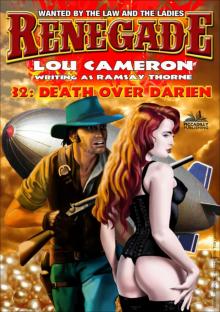 Renegade 32
Renegade 32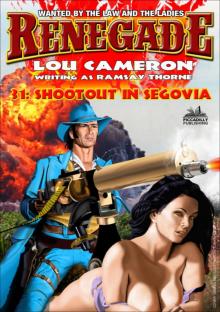 Renegade 31
Renegade 31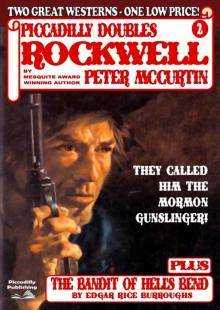 Piccadilly Doubles 2
Piccadilly Doubles 2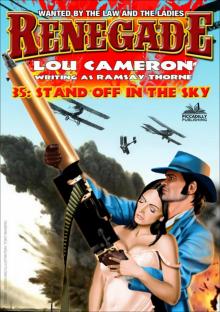 Renegade 35
Renegade 35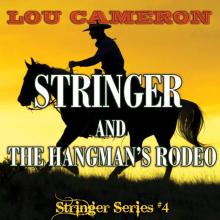 Stringer and the Hangman's Rodeo
Stringer and the Hangman's Rodeo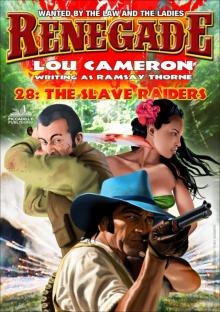 Renegade 28
Renegade 28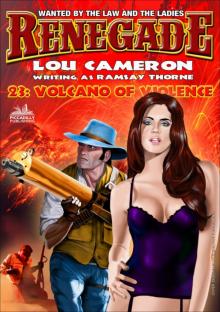 Renegade 23
Renegade 23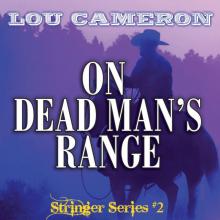 On Dead Man's Range
On Dead Man's Range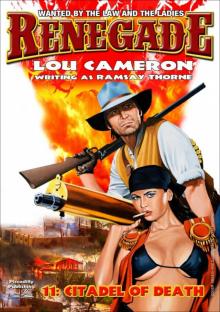 Citadel of Death (A Captain Gringo Western Book 11)
Citadel of Death (A Captain Gringo Western Book 11)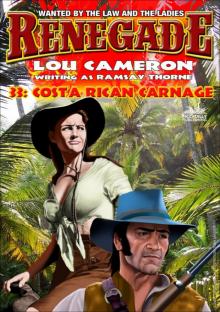 Renegade 33
Renegade 33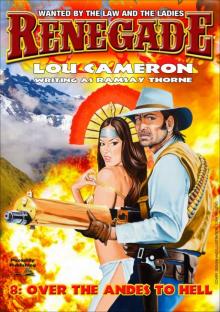 Over the Andes to Hell (A Captain Gringo Western Book 8)
Over the Andes to Hell (A Captain Gringo Western Book 8)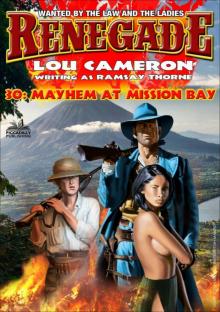 Renegade 30
Renegade 30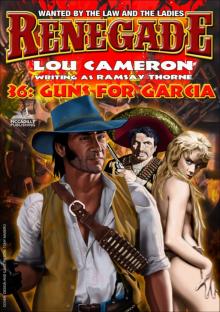 Renegade 36
Renegade 36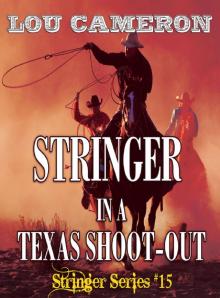 Stringer in a Texas Shoot-Out
Stringer in a Texas Shoot-Out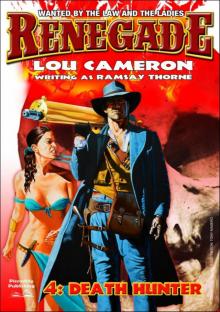 The Death Hunter
The Death Hunter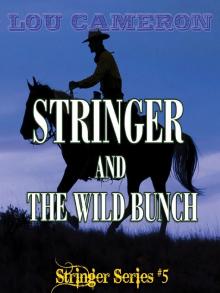 Stringer and the Wild Bunch
Stringer and the Wild Bunch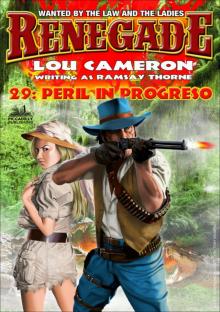 Renegade 29
Renegade 29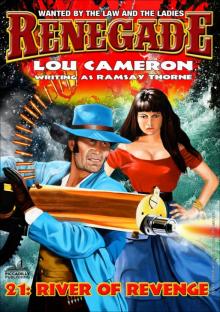 Renegade 21
Renegade 21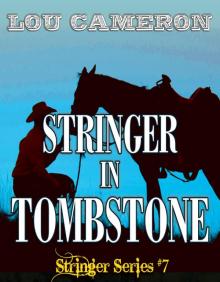 Stringer in Tombstone
Stringer in Tombstone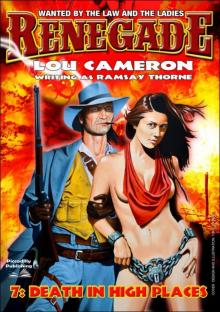 Death in High Places (A Renegade Western Book 7)
Death in High Places (A Renegade Western Book 7)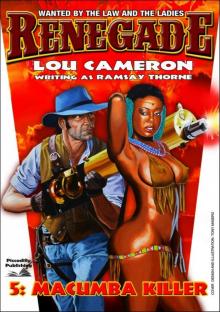 Macumba Killer
Macumba Killer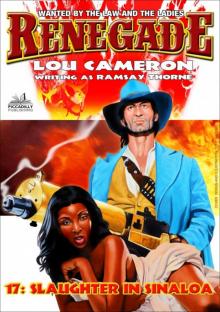 Renegade 17
Renegade 17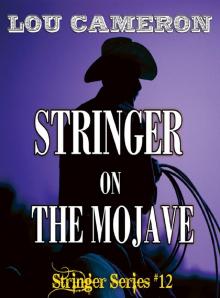 Stringer on the Mojave
Stringer on the Mojave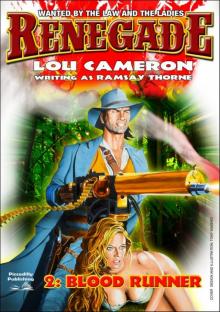 Blood Runner
Blood Runner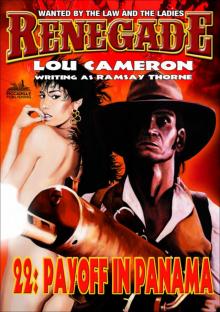 Renegade 22
Renegade 22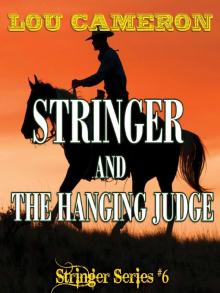 Stringer and the Hanging Judge
Stringer and the Hanging Judge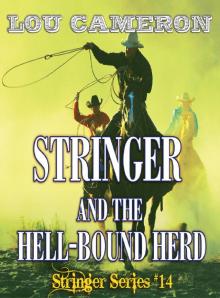 Stringer and the Hell-Bound Herd
Stringer and the Hell-Bound Herd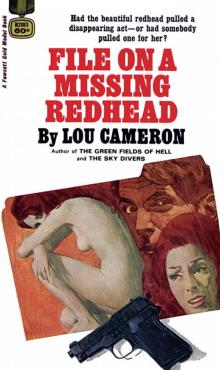 File on a Missing Redhead
File on a Missing Redhead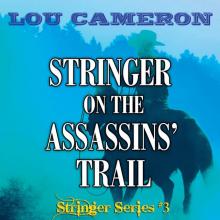 Stringer on the Assassins' Trail
Stringer on the Assassins' Trail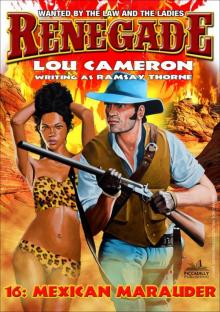 Mexican Marauder (A Captain Gringo Adventure #16)
Mexican Marauder (A Captain Gringo Adventure #16)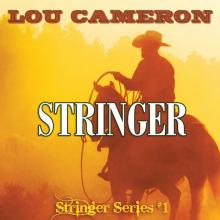 Stringer
Stringer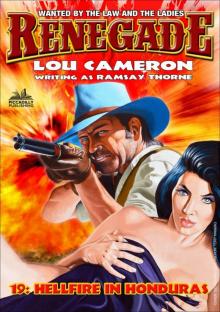 Renegade 19
Renegade 19 Stringer and the Oil Well Indians
Stringer and the Oil Well Indians Stringer and the Lost Tribe
Stringer and the Lost Tribe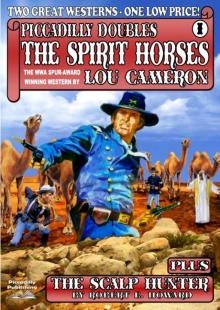 Piccadilly Doubles 1
Piccadilly Doubles 1 Stringer and the Border War
Stringer and the Border War Renegade
Renegade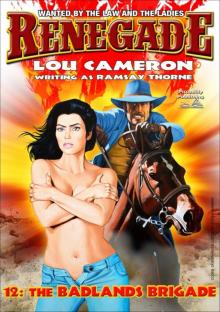 The Badlands Brigade (A Captain Gringo Adventure Book 12)
The Badlands Brigade (A Captain Gringo Adventure Book 12) Stringer and the Deadly Flood
Stringer and the Deadly Flood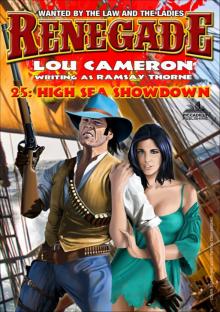 Renegade 25
Renegade 25 The Great Game (A Captain Gringo Western Book 10)
The Great Game (A Captain Gringo Western Book 10)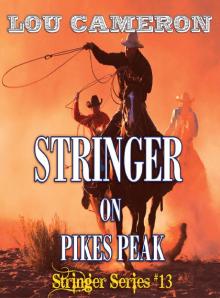 Stringer on Pikes Peak
Stringer on Pikes Peak